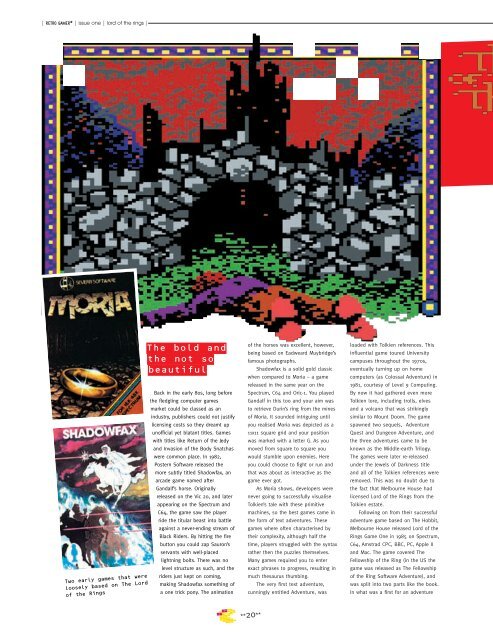Create successful ePaper yourself
Turn your PDF publications into a flip-book with our unique Google optimized e-Paper software.
| ❙❋❯❙✄❍❇◆❋❙* | issue one | lord of the rings |<br />
Two early games that were<br />
loosely based on The Lord<br />
of the Rings<br />
The bold and<br />
the not so<br />
beautiful<br />
Back in the early 80s, long before<br />
the fledgling computer games<br />
market could be classed as an<br />
industry, publishers could not justify<br />
licensing costs so they dreamt up<br />
unofficial yet blatant titles. Games<br />
with titles like Return of the Jedy<br />
and Invasion of the Body Snatchas<br />
were common place. In 1982,<br />
Postern Software released the<br />
more subtly titled Shadowfax, an<br />
arcade game named after<br />
Gandalf’s horse. Originally<br />
released on the Vic 20, and later<br />
appearing on the Spectrum and<br />
C64, the game saw the player<br />
ride the titular beast into battle<br />
against a never-ending stream of<br />
Black Riders. By hitting the fire<br />
button you could zap Sauron’s<br />
servants with well-placed<br />
lightning bolts. There was no<br />
level structure as such, and the<br />
riders just kept on coming,<br />
making Shadowfax something of<br />
a one trick pony. The animation<br />
of the horses was excellent, however,<br />
being based on Eadweard Muybridge’s<br />
famous photographs.<br />
Shadowfax is a solid gold classic<br />
when compared to Moria – a game<br />
released in the same year on the<br />
Spectrum, C64 and Oric-1. You played<br />
Gandalf in this too and your aim was<br />
to retrieve Durin’s ring from the mines<br />
of Moria. It sounded intriguing until<br />
you realised Moria was depicted as a<br />
11x11 square grid and your position<br />
was marked with a letter G. As you<br />
moved from square to square you<br />
would stumble upon enemies. Here<br />
you could choose to fight or run and<br />
that was about as interactive as the<br />
game ever got.<br />
As Moria shows, developers were<br />
never going to successfully visualise<br />
Tolkien’s tale with these primitive<br />
machines, so the best games came in<br />
the form of text adventures. These<br />
games where often characterised by<br />
their complexity, although half the<br />
time, players struggled with the syntax<br />
rather then the puzzles themselves.<br />
Many games required you to enter<br />
exact phrases to progress, resulting in<br />
much thesaurus thumbing.<br />
The very first text adventure,<br />
cunningly entitled Adventure, was<br />
loaded with Tolkien references. This<br />
influential game toured University<br />
campuses throughout the 1970s,<br />
eventually turning up on home<br />
computers (as Colossal Adventure) in<br />
1981, courtesy of Level 9 Computing.<br />
By now it had gathered even more<br />
Tolkien lore, including trolls, elves<br />
and a volcano that was strikingly<br />
similar to Mount Doom. The game<br />
spawned two sequels, Adventure<br />
Quest and Dungeon Adventure, and<br />
the three adventures came to be<br />
known as the Middle-earth Trilogy.<br />
The games were later re-released<br />
under the Jewels of Darkness title<br />
and all of the Tolkien references were<br />
removed. This was no doubt due to<br />
the fact that Melbourne House had<br />
licensed Lord of the Rings from the<br />
Tolkien estate.<br />
Following on from their successful<br />
adventure game based on The Hobbit,<br />
Melbourne House released Lord of the<br />
Rings Game One in 1985 on Spectrum,<br />
C64, Amstrad CPC, BBC, PC, Apple II<br />
and Mac. The game covered The<br />
Fellowship of the Ring (in the US the<br />
game was released as The Fellowship<br />
of the Ring Software Adventure), and<br />
was split into two parts like the book.<br />
In what was a first for an adventure<br />
**20**


